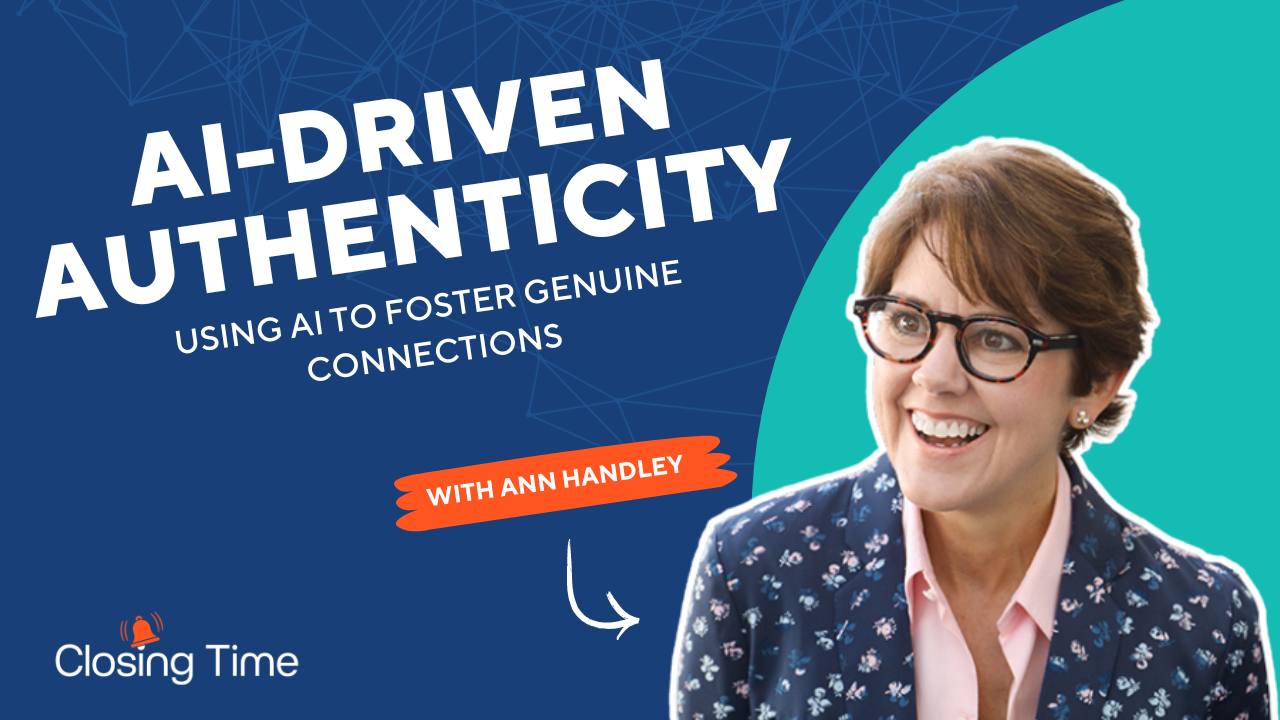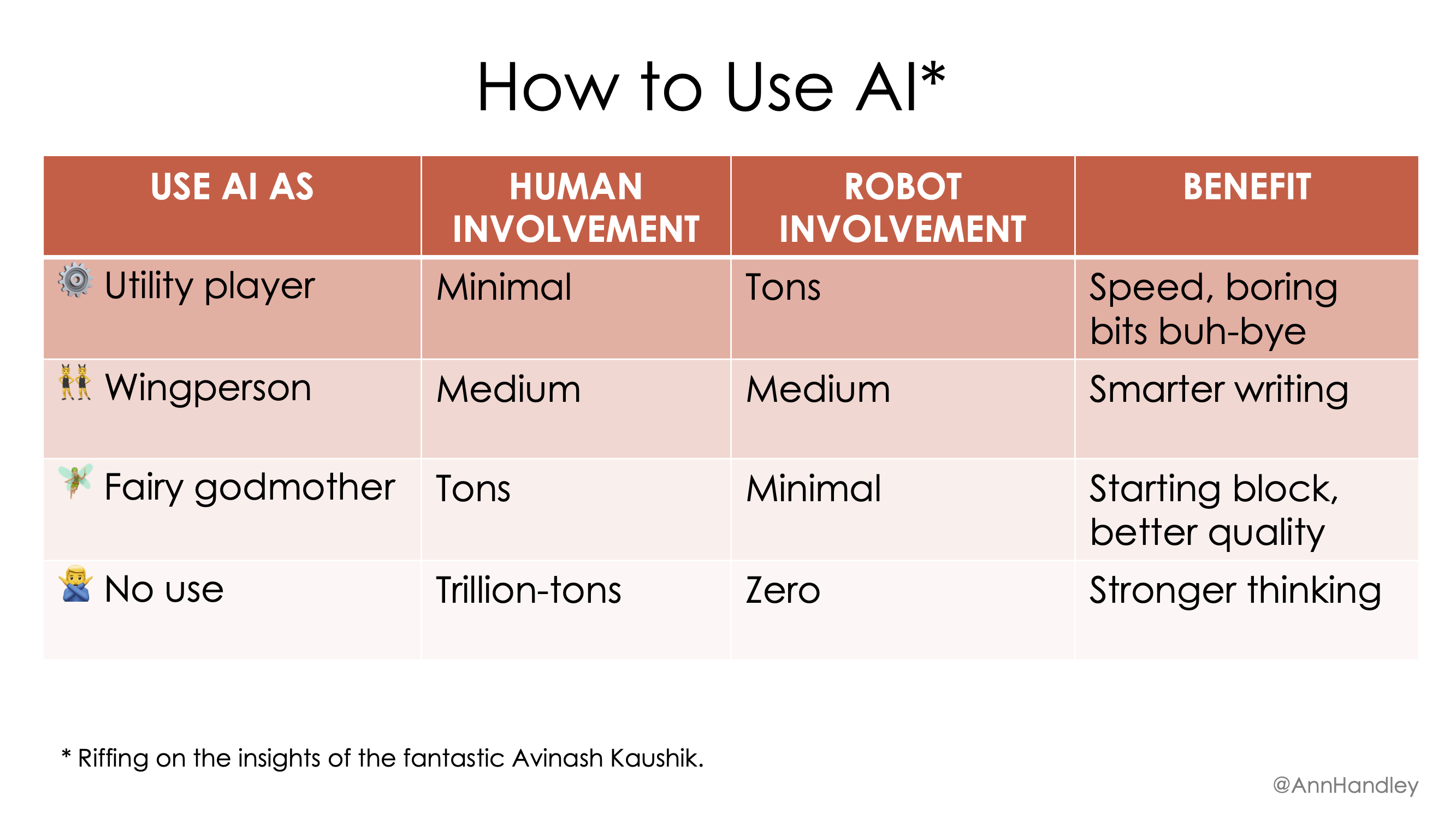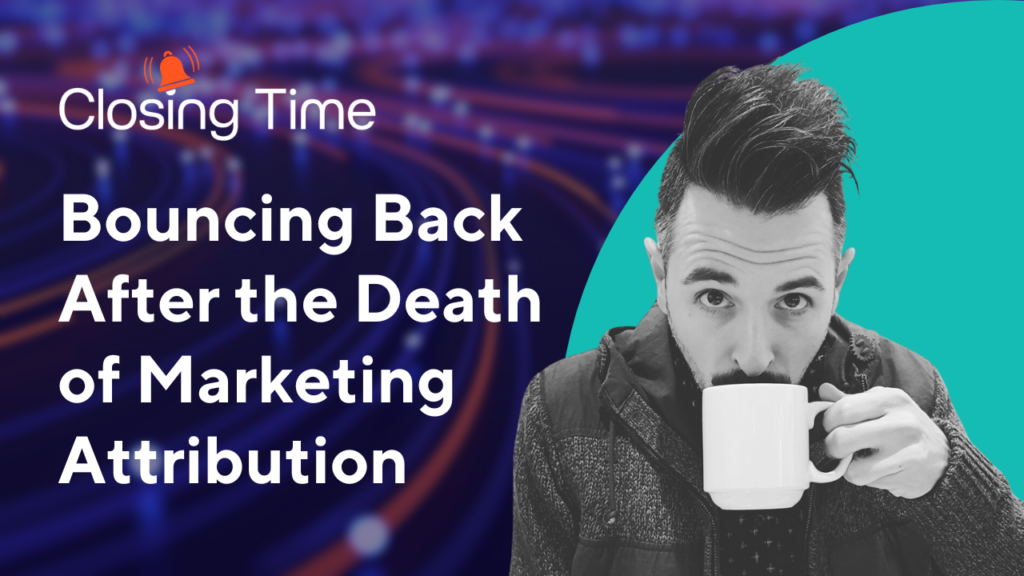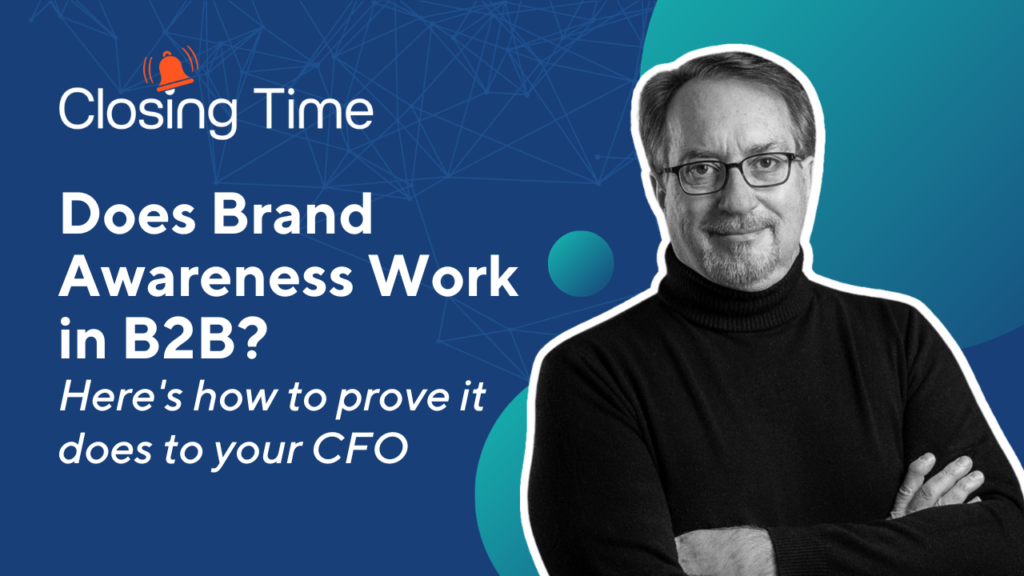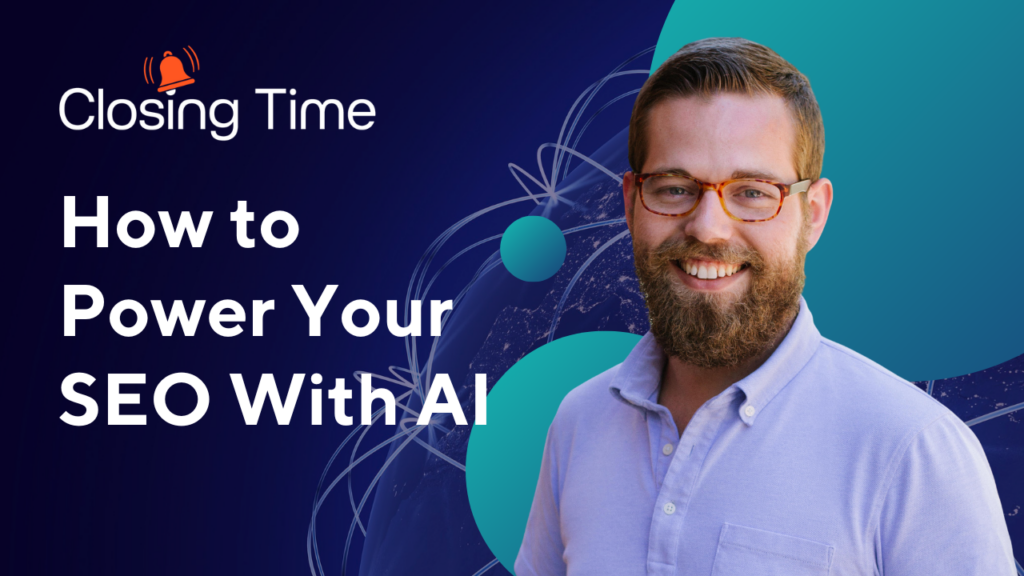With AI, now marketing professionals can essentially create
what’s mediocrity at scale.
So in the age of AI, how do marketing pros now create great content?
We’re going to talk all about it in this episode of Closing Time.
Welcome to Closing Time the show for go to Market Leaders.
My name is Chip House.
I’m the CMO at Insightly CRM, and today. I’m super excited to be joined
by Ann Handley and of course, Ann is a well-known writer.
And so I’m going to read the intro that she wrote for me.
So, Ann Handley helps businesses stand out in the sea of same.
She’s the world’s first Chief Content Officer.
A Wall Street. Journal Best selling author of three books
and has co-founded two multimillion dollar companies.
She is a partner in Marketing Profs an education and training company
that trains teams at the world’s most distinct businesses,
an inductee to the Content. Marketing Hall of Fame.
She is also an avid collector of old school typewriters
and a Tina Fey superfan, who isn’t?
Get ready.
Here comes Ann Handley.
Thanks for joining us, Ann, that was awesome.
Gosh, Chip, I’m so hyped to be here today.
So thank you. Thank you.. Thank you. That was so nice.
So of course.
And so I had to read it because it was so well-written.
And who doesn’t like Tina Fey, you know,
I love Tina Fey.
I don’t know.
And so, we’re going to drill in, we’re going to talk about A.I.
and we’re going to talk about email marketing.
And there’s like I said in the intro, essentially
there’s a lot of positives with AI now, and there are a lot of challenges
that it’s creating, number one, volume and mediocre content out there.
And it certainly is enticing for sales and marketing pros
to optimize everything they’re doing.
But there’s a right way and there’s a wrong way to do it.
So let’s just kind of start there.
What are your thoughts?
Yeah, I mean, first of all,. I think you’re absolutely right
that it has never been easier to create mediocrity at scale.
And what I mean by that is that these AI tools
put capabilities in the hands of everyone.
And, you know, Chip, I wrote a book about, you know, titled Everybody Writes.
So I am all in on giving the tools to everyone
to create better content, to write, to publish, to produce.
But, you know, the a little bit of the challenge with AI has been that,
you know, it does give us the tools to to create that mediocrity at scale.
And so the question in my mind has been since day one of, you know, well,
how do we not just slide into mediocrity and how do we use these tools
to elevate our output, to elevate our presence
and to increase the connections with our audience?
And that’s, that right there is the crux of the issue
that I am obsessed with in 2024.
You know, it was just a year ago, almost a year ago, just over a year
ago, actually, November 30th, 2022.
And that is burned into my brain because that is the day
that ChatGPT 3.5 first came out like and was suddenly
put these this tool AI writing tool in the hands of each of us.
Right so for the first time ever, even though AI had existed
for a really long time and even though generative
AI had been evolving over months and over years
for the first time ever, it was suddenly accessible to everyone.
And so the question immediately became, Oh, is this going to enhance
human capabilities or is it going to replace us as marketers?
Or maybe the third door is it, the third option, Is A.I.
completely overhyped?
And since then, I think things have calmed down a little bit.
Things have settled, and I think 2024 is the year
where we don’t talk about you know, we don’t talk about the hype of AI.
We don’t talk about, you know, the sort of party tricks that we’ve all seen it
do, like that conversation that it had with a New York Times reporter where it
it almost had this, you know, sort of love relationship with him.
Yeah. Yeah, exactly.
So I think we’ve gone past
that and I think we’ve gone past, for the most part, the fear of it.
And I think 2024 is all about when we stop talking about those things
and start figuring out some very practical applications of it.
And so that’s what I’m most excited about.
No, makes good sense.
There’s all sorts of metaphors
you can come up with this, like running with scissors.
I mean, I don’t know if you’re a golfer. Ann, but, you know, it’s like often
changing golf clubs doesn’t make you a better golfer.
Right?
And so adding. AI may not make you a better writer,
your friend and mine,. Jay Baer joked that A.I.
equals average information. Right.
And so I think that is the challenge.
And so in our pre call,
we talked a little bit about this and you talked about as A.I.
begins to be used more broadly and sales and marketing pros are using it,
the importance for relationships really rises to the forefront.
Can you talk more about what you meant by that?
Yeah, Yeah.
So I mean, I actually am very excited about the advent of generative
AI in email, certainly, but also just more broadly in marketing
because I think of generative
AI as ushering in what I call the great writing renaissance.
And you might know that if you think about the word
renaissance, it has an AI right in the middle of it, right?
That that’s the A.I.
is embedded Renaissance.
And so what I why I call it that is because I think that it calls us
to a place where we need to publish and produce
writing content, material that people love, not just that
they like, not this that they find useful, but they truly connect with.
And so that’s what I mean by relationships.
I think we need to use our marketing assets, you know,
our email, our landing pages, our social posts, all of it
to forward, or to
pull forward those relationships that we have with our audience.
Because, you know in my mind the last couple of years
or maybe the last ten years or so ever since I published content rules in 2010,
which in Internet years that’s like,. I don’t know,
like, like 2000 years ago, that’s what it feels like.
Yeah, it is.
Yeah.
ions, totally ions, but, you know, it’s always been about
it’s always been about, you know, reaching as many people as we can.
And I don’t think that that’s the name of the game in 2024 anymore.
It’s not about producing more and getting bigger audiences.
Instead, it’s about serving and connecting with the people
that truly matter to us and our businesses.
And so that’s why I think that the great writing renaissance with AI embedded
right in it offers us that ability to build those those relationships.
And I think one of the best ways to do that is through email, because in a world
where we do have unlimited opportunities,
I think the direct audience relationships are the name of the game.
And we see that like, you know, with cookies going away later this year
in 2024 would be one reason why I think we need to get
those direct relationships with our customers.
Social media is just kind of a it’s a difficult place
to break through right now.
But again, it’s not about breaking through.
It’s not about reaching, but it’s about using those platforms
to build those direct audience relationships with our
with our prospects and with our customers.
Yeah, that makes good sense.
And it’s building on the piece of us that’s human.
And I think, you know, we’ve talked a lot about
we’ve had actually had Todd Caponi on Closing Time
and we talked to him about how marketers and salespeople tend to ruin everything.
Right? We ruined the phone and then we ruined email.
Then we ruined, you know, telemarketing.
And so, you know, we can’t have nice things.
And so let’s not ruin A.I.
and let’s approach it in the right way.
And so kind of building on that, you have relationships.
And we also talked about the idea of building stronger connections, Ann,
in the age of AI, what did you mean by that?
Yeah, can I just comment on Todd’s
comment though before we talk about that?
Yeah, I mean, part of that is true.
You know, we do ruin things, but. I don’t think it’s like I don’t like that
marketer, all marketers are painted by that because
you know, people like you and I and a lot of the people who we know
like we do really show up in truly authentic ways.
We want to build those relationships.
And so I kind of I don’t know,. I get a little bit defensive when I
when people start talking about how marketers
ruin everything because I don’t think that’s the case.
I think there are a few bad apples who once email came out,
they created spam, you know, and yeah.
Exactly.
And so it’s not all of us, you know, and that’s what my work in
my entire career has been about is to call marketers to a higher place.
Because I don’t believe that anybody in marketing today
and anybody who has ever been in marketing who I truly like and respect
and would want to work with, would wake up, you know, as a child
or would would grow up as a child and be like, you know,
I can’t wait to spam the heck out of my community.
And I can’t wait to grow a list
and just hammer the heck out of it like no one wants that.
And so I really do believe that marketers fundamentally want to do right.
Sometimes they are held to standards that are unreasonable
within organizations, but that’s a whole other conversation.
So anyway, no, I’m glad you brought it up because it’s sort of like the same level
of restraint, Ann, that we all had in the early 2000s, do not spam the crap
out of everybody that we have to have in mind here relative to AI.
Yes, exactly. We are in control.. We have a choice to make.
And that’s why I’m suggesting
that we do need to embrace this great writing renaissance.
But anyway, sorry to derail your questioning there, but I just.
I’m glad you commented about it.
Yeah, derail
away. Okay. You know, oh my gosh.
So we can pick on Todd after this.
Nothing but love Todd,
I know what he means and I know where that sentiment comes from and
there is some truth in it, but. I don’t think it applies across the board.
What do I mean by
and oh my gosh, I totally forgot what you just asked, relationship.
I said, yeah, you talked about relationships
and I think it’s sort of closely related is like forming tighter connections.
Oh, connections. Right.. That’s what it was.
Sorry.
I think that
we spend a lot of time in marketing
thinking about how we look from a brand point of view.
And I think that one of the things that generative
AI offers us is the ability to do what we’ve always wanted to
do but have never quite had
the time or the luxury maybe
is to think about our brand voice, our recognizable brand voice.
Because even though generative. AI is often marketed
as a kind of writing tool, I actually I’m using like air quotes there.
I actually think of it as more of an efficiency tool.
It’s like, yes, broadly it can help you create and write.
But more specifically, I don’t think it’s really about the writing.
I think it’s more about giving you some, you know, efficiency in other areas.
We can talk more about that in a second if you want.
But I think the idea of giving us back some time that we have spent,
you know, doing things that can be that can we can use
AI as a kind of wing person or wingman to help us with and
using that time to,
you know, to think more strategically about how we’re showing up,
you know, using our brand voice, thinking through the way
that we are communicating with our audience.
And so that’s where I get excited when I start thinking about that kind
of stuff, because every time I’ve talked about brand voice over the past
few years, people have said, Yeah, yeah, we have that.
You know, it’s in a binder in a conference room
somewhere, or it’s like in a file on the CMO’s
hard drive, you know, And it is never like it just has never quite evolved
for most brands, for a lot of brands, especially in the B2B space.
And so my hope and what I’ve been trying to educate marketers around
is that this is the time like think about how do you
so if relationships are important, if connections are important,
if we need to build those direct relationships, if we need to build trust
with our audience, then let’s think about the best vehicle to do that.
And very often to me, it comes down to how we’re communicating,
not just what we’re saying, but how we’re saying it.
Brand voice.
Yeah, it makes great sense. And you’re right.
I mean, I see it as an efficiency tool
as well, and I’ve used it very successfully that way.
And it’s like, Oh, I was going to write something like that anyway.
And so now I wrote it faster and I can just make it better
and leverage my own knowledge to do so.
It’s also great at outlining.
I’ve kind of found, you know, it’s, you know, just
because it has, you know, the ability to search
tons of information, it can quickly come up with here’s
what should be in whatever you’re writing, Right.
That’s kind of helpful. Yeah. Yeah.
Fore sure.
I think of AI in sort of four distinct areas.
The first is a kind of utility player, which is kind of
what you’re talking about there,
you know, which is just to do some sort of perfunctory, rudimentary
kind of things for us as writers or as content creators or as marketers.
The second way is as a sort of and I alluded to this earlier,
but like a wingman or a wing person to give the non gendered name
where we can actually start to elevate what we’re doing a little bit.
The third way is the way that I use it and I call it the fairy godmother
only because I like that fairy also has the AI embedded in it,
and I sort of like,. I can’t get away from word play.
So and a fairy godmother way, yeah, a fairy godmother for me
is quite often like.
Sometimes I’ll use. AI as almost like a reality check.
Like what’s missing from this?
Because I have a certain point of view
and, you know, very often I have that sort of curse of knowledge, right?
So if I can tell AI like this is the persona that I’m trying to speak to.
This is the individual who I need to picture in my mind’s
eye, like, give me a reality check on this.
What am I missing here?
And so that’s the kind of feedback that is like
very important to me as a writer because it gets me out of my own head.
And rather than waiting for audience feedback, it sort of allows me
to accelerate that a little bit and produce content that’s even stronger.
So that’s a third way and Probably one of my favorite ways to use it.
And the fourth way is absolutely no use because.
Yeah, sometimes. It’s an option.
You don’t need it. Like for me, writing is thinking.
I need that first draft process to understand
what my point of view is and what I’m thinking Now.
I recognize that not everybody is like this.
My own daughter works in content marketing.
She’s in her very first job out of college
and she loves it for first drafts because she does.
She’s not that kind of creator.
And so I think, you know, it depends on kind of what your perspective is.
But no use is a perfectly legitimate use of
AI as well.
Yeah.
No I love that framework, Ann, and I’m that kind of person too.
I feel like I need to write sometimes just to know what I think, you know.
And once it’s down on paper and then I’m like, okay,
now I have a framework and now I could maybe take it to
AI to help me flesh it out potentially.
Yeah. Yeah, exactly.
You, you talked about brand, you know, the connections to your brand with this.
And when I think about running
our team at scale, right, we produce a ton of content.
And how do we all stick true to our brand and our brand voice.
And frankly, it’s a challenge.
And so kind of in our pre call, we just talked about the rise
of the importance of brand and, you know, for marketers
there’s a lot of things we’re thinking about is SEO and branded
search versus non-branded search and things like that.
You had an opinion on this.
Is it going to be much more difficult for us to compete
now that AI has taken the lead for many people?
Yeah, I think so.
From a, at least from an unbranded search perspective.
And what I mean by that is. I do think that, you know, over the past
well, since the beginning of the modern Internet,
you know, since the start of SEO
that we have been
thinking about using search engines as a way to drive traffic to us
based on keywords and keyword optimization and all that kind of stuff.
I don’t, I think it’s either going to significantly diminish or possibly
go away entirely.
I’m not exactly sure because I don’t have a crystal ball.
And again, you know, I’m not a search person,
but in my mind, like when I look at the evolution of tools
and the way that we are using generative AI,
it just it makes sense to me that we will see less unbranded search.
So, for example, you may see fewer people who are searching for your category.
And so, you know, what does that mean?
It means that you’ve got to think about how do you elevate your brand?
How do you be part of that consideration set early on
instead of just trying to be there when they’re searching for you?
And so I think that, you
know, it’s you know, we’ve done both in marketing over the past few years.
But I think in 2024, you know, brand is brand is everything.
I think we need to be building our brands, our brand voice.
We talked about that a second ago
because I do think that it’s going to be increasingly important to be in the
in the brain of your buyers
much sooner than maybe we have thought of it in the past.
And I love that. I think brand is back.
I don’t know if it ever would fully away, but it definitely is back.
And you know, if you’re a marketer and you’re not, you’re only talking
to 5% in market, you’re doing it wrong, right?
So there’s a bunch of people
that are potential customers in the future that you have to influence.
Yeah, and maybe that’s the way you see it, Ann.
Yeah. Yeah, for sure.
I mean, brand has always been really hard to quantify
and I think that’s a challenge for us as marketers is to make those connections.
And it’s not easy.
But I do think that we as a, as a group and as a community
do need to focus on it in 2024,
you know, for all the reasons that we talked about too, about relationships,
about
brand voice, about building trust and affinity with your audience.
Like all of those things. I think are rolling up.
And certainly AI has been an accelerator for all those things.
But I do feel like marketing has been moving in this direction for a while.
Yeah, makes a ton of sense and Ann, thanks so much.
That’s all the time we have today.
But it was great having you. Yeah, for sure. Thank you.
Yeah, went really, really fast.
Went fast
and we’d love to have you back some time.
And to all of you out there, thank you so much for watching.
We hope you found it valuable and we’d love it if you could subscribe
to the channel and we’ll see you next time.



